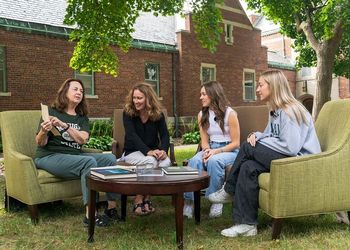JENNIFER HEEMSTRA: LIFTING SPIRITS WITH MUSIC AND INFORMATION

Concert pianist Jennifer Heemstra was working as a music instructor in Rome a couple of years ago when her husband’s job with the U.S. State Department moved them to India.
But it is Heemstra, not her husband, who is often thought to be employed by the U.S. State Department in the Calcutta (Kolkata) area, population 14 million.
It’s easy to see why. Over the past 12 months, she has performed for roughly 50,000 people at 42 classical music concerts—all of which she organized—both within and just outside the city, which is known as the cultural capital of India.
Heemstra is the heart and soul of Kolkata Classics, a series of free musical recitals she created shortly after her arrival in the city. She’s been joined on stage by several other virtuosos, including fellow MSU alumna Carrie Pierce. Her guests hail from the upper reaches of the classical music and opera worlds. And, like Heemstra, they all play for free.
Most of the time the performers appear in beautiful concert halls, hotel ballrooms and well-heeled private schools.
But the group also veers far from traditional venues.
They perform in slums, orphanages and Calcutta’s sprawling red-light district, the largest in Asia and home to tens of thousands of women and children stuck in the sex trade.
“I want to make the invisible people of the city visible through music,” Heemstra said. “Some of the poor children had never seen a piano. They’ve never seen a cello.”
Now beginning its second year, this season’s Kolkata Classics bears a reference to Hathor—the legendary Egyptian goddess responsible for women’s health and music.
Why? Because Heemstra is slipping in pre-concert health fairs when she performs in places where Calcutta’s poorest people live.
Women, who often bring their children to the concerts, may learn about HIV and AIDS prevention, receive vaccines, open bank accounts and register for government-issued identification cards—most for the first time ever.
To date, generous Calcutta arts patrons and organizations have floated Kolkata Classics, which is recognized in India as a trust, or nonprofit.
“I’d like to make this sustainable,” Heemstra said during a recent visit on campus. She’s seeking to have the series qualify for 501(c)(3) tax-exempt status in the United States, which could help boost her crowdfunding campaign.
“I’d love to be able to pay the artists and continue this work. It’s all about connecting, sharing energy and lifting spirits,” she said.
“I felt the only way to be surrounded by such poverty and inequality was to try to do something about it. We need to create a world where women’s ideals are as valued as those of men. This is a small part in the larger human struggle.”



